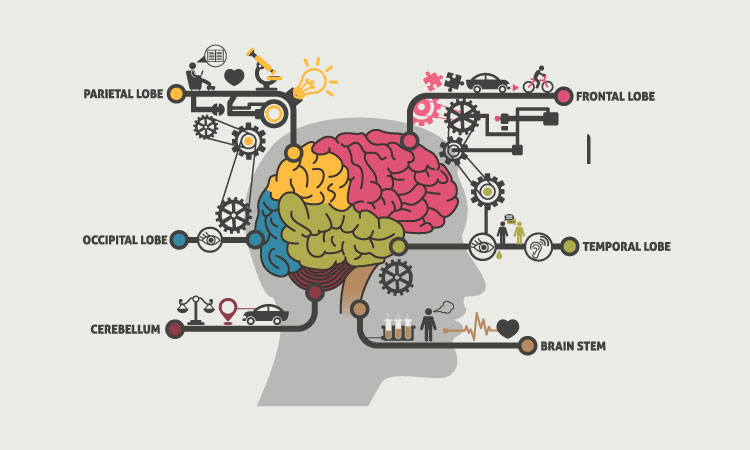Back in the 1960s Dr. Paul D. Maclean devised the Triune Brain model as a way to explain the brain’s evolution while reconciling rational human behavior with more primal and violent outbursts. The Triune Model suggests three parts to the brain:
- Reptilian (posterior, brain stem): the source of instincts
- Paleommamalian (mid-brain): the source of emotions
- Neomammalian (cortex): the source of rational thought
In this hierarchy, the older brain structures (reptilian, paleomammalian) are ruled by the newer one (neomammalian). The cortex regulates and inhibits instincts and emotions so that you control behaviors and responses.
 When you experience extreme stress, however, this model often becomes disrupted: Your survival instincts assume control. In this scenario, the lower brain structures hijack and override the cortex. Theoretically, when stress ends, you shift out of survival mode and back into regulated mode. Sometimes the shift fails to properly or fully occur, however. When this happens, the rational mind doesn’t reclaim control and the lower brain, with nothing to inhibit it, floods you with so much stimuli that you shift into meltdown mode. Reclaiming control relies on helping your neomammalian brain resume its regulatory and inhibitory activities; the key to this is your prefrontal cortex.
When you experience extreme stress, however, this model often becomes disrupted: Your survival instincts assume control. In this scenario, the lower brain structures hijack and override the cortex. Theoretically, when stress ends, you shift out of survival mode and back into regulated mode. Sometimes the shift fails to properly or fully occur, however. When this happens, the rational mind doesn’t reclaim control and the lower brain, with nothing to inhibit it, floods you with so much stimuli that you shift into meltdown mode. Reclaiming control relies on helping your neomammalian brain resume its regulatory and inhibitory activities; the key to this is your prefrontal cortex.
Known as the seat of your executive function, the prefrontal cortex affects self-regulation, decision-making, and attention processes. After high stress, this part of your brain can experience a decrease in its capability. From lessened blood flow on the left side (the location of analytical processes) to increased activity on the right (the location of sadness and anger), alterations in your prefrontal cortex can cause stimuli flooding, emotional overwhelm, and dark mood swings.
Getting your cortex back on track (or, as one neuroscientist described it to me, “getting your drunk CEO sobered up and out from under the desk”) can be done naturally through two simple daily practices. Both processes train your ability to focus your attention, the major inhibitory effort of your cortex.
Reduce Anxiety Through Mindfulness
Many times the lower brain structures focus on the past or the future. Mindfulness deliberately places attention in the present moment, activating the cortex through an observational process that shuts down unnecessary instincts and emotions, while activating rational thinking. Try this exercise two to five times per day in moments of tension and also relaxation:
1. Deliberately pause what you’re doing.
2. Take a deep breath in; imagine in your mind taking a step back.
3. Turn inward; notice what you feel inside your body and mind.
4. Suspend judgment; let anything come up. Observe without evaluating.
5. Label what you notice (“I’m feeling _______________”).
6. Observe the experience as if you were watching a friend move through it.
7. Notice when the emotion or experience subsides.
8. Redirect your attention to a pleasant or desired focus.
Reduce Anxiety Through Meditation
 The process of meditation is a terrific strategy for training your brain in the area of attention because it deliberately creates neural pathways dedicated to deliberate control of your focus. Studies have shown that in as little as five minutes per day over a period of just ten weeks, meditation can significantly increase prefrontal activity and strength, resulting in a quieting of your overall mind and specific lower brain structures. The myth about meditation is that you have to empty your mind in order for it to be successful. In fact, your mind must wander in order for meditation to have the desired training effect. Try this:
The process of meditation is a terrific strategy for training your brain in the area of attention because it deliberately creates neural pathways dedicated to deliberate control of your focus. Studies have shown that in as little as five minutes per day over a period of just ten weeks, meditation can significantly increase prefrontal activity and strength, resulting in a quieting of your overall mind and specific lower brain structures. The myth about meditation is that you have to empty your mind in order for it to be successful. In fact, your mind must wander in order for meditation to have the desired training effect. Try this:
For just five minutes every day take yourself to a quiet, safe space and close your eyes. Choose something to focus your mind on; this can be a sound, a word, an image, anything. Let all thoughts subside and maintain an attentive focus. When your mind wanders or becomes chatty, simply redirect it to your chosen focus (and know that every time you do, you are successfully training your brain).
Mindfulness and meditation are the two most effective brain trainers to support optimal prefrontal cortex functioning. The more you incorporate them into your daily experience, the more you will be training your brain to recalibrate, balance, and control.
An added bonus: The more you strengthen your brain in moments of low stress, the better it will respond in high-stress situations allowing you to reduce anxiety.




17 Comments
Holly Scott
Great description of the Truine brain model and the effects of stress on brain functioning. I am gong to try out your Mindfulness exercise. It looks like something that will be easy to do to throughout the day. Lower stress levels is almost always part of my client’s list of therapy goals. Hope it helps!
Michele Rosenthal
@Holly — Thanks for your feedback! When writing about science it’s always a challenge to make it readable and keep the full integrity of the subject.
I love that mindfulness exercise because it’s so simple and easy to do. Of course, like anything, it requires massed practice to reap the benefits. If your clients come back after one or two attempts and don’t notice a difference, remind them that the brain learns through repetition, and particularly 30 consecutive days of repetition. Let me know how it goes!
Madelyn Griffith-Haynie, MCC, SCAC
Want to let you know that I have linked this article as Related Content to “The Virtues of Lowering your Standards” on ADD-and-So-Much-MORE.
Please take a moment to go take a look, and to engage in dialogue with any of my posts you find “related” to what YOU do.
You are welcome to leave a link to something else you have written in the comments section (one per comment or you’ll be auto-spammed, btw)
Links back always appreciated, of course.
xx, mgh
(Madelyn Griffith-Haynie – ADDandSoMuchMore dot com)
– ADD Coach Training Field founder; ADD Coaching co-founder –
“It takes a village to educate a world!”
Sam
I’m Very happy I stumbled across this. It covers several topics I’ve personally been interested in for quite a while now (Some might call it an obsession). It’s Very well translated for explaining some pretty difficult processes………P.S. THANK U FOR WRITING, YOU DA BOMB!!
Sandra Wallis
I agree with you, she found a way to explain the most complex processes in a very understandable way!!
Jane Fotos
Jane, I thought you would find this interesting. Barbara
Rose Caiola
We should be strengthening our brains even in moments of low stress, so we are better prepared when we face high-stress situations. You will remain anxious until you make a conscious effort to let it go.
Lucy
Great article. I feel as if my brain has been hijacked. When you talk about stimuli flooding, emotional overwhelm and dark mood swings – all relevant for me (I have ME/CFS). I note the importance of focussing your attention in the article. I discovered Mindfulness and Meditation five years ago and although they have helped me stay sane, I am still ill with anxiety and stress so much so that anxiety actually causes my fatigue, I am convinced. I would like to step up my Mindfulness but find it very hard to do. I am absolutely convinced it is the answer for me though!! Any advice???!!!
Gianna Caiola
Hi Lucy,
We’re not in the habit of giving advice because our experts always do it better! Here’s some reading material to help you update your mindfulness: 5 Ways to Reduce Anxiety Naturally, Understanding Anxiety, Taking the Stress Out of Meditation
Happy Reading!
RWM Staff
Lucy
Hi Gianna. Thanks for your response and for posting the links to these articles. Very interesting.
Lucy
Petra
Lucy, look at the Gupta-program, it might help you! He also had had ME. Best wishes, Petra
Gianna Caiola
Thanks Petra, I completely forgot about that one!
xo
RWM Staff
Lucy
Hi Petra. Guess what? I am doing the Gupta programme currently!! It’s great. Many thanks for the suggestion though.
Best wishes
Lucy
Madeleine
I needed to read this! I always forget about how important it is to meditate everyday until I miss a few days in row and my energy is completely out of whack!
Rachel
Great practicals! Thanks for sharing! I love this site!!
Elviira
Great post! There is less need for medicines if you embrace natural ways to relieve anxiety. I’m a big fan of meditation. It is really effective, but it should be done frequently to get the best results. I admit that I do it far too seldom nowadays…